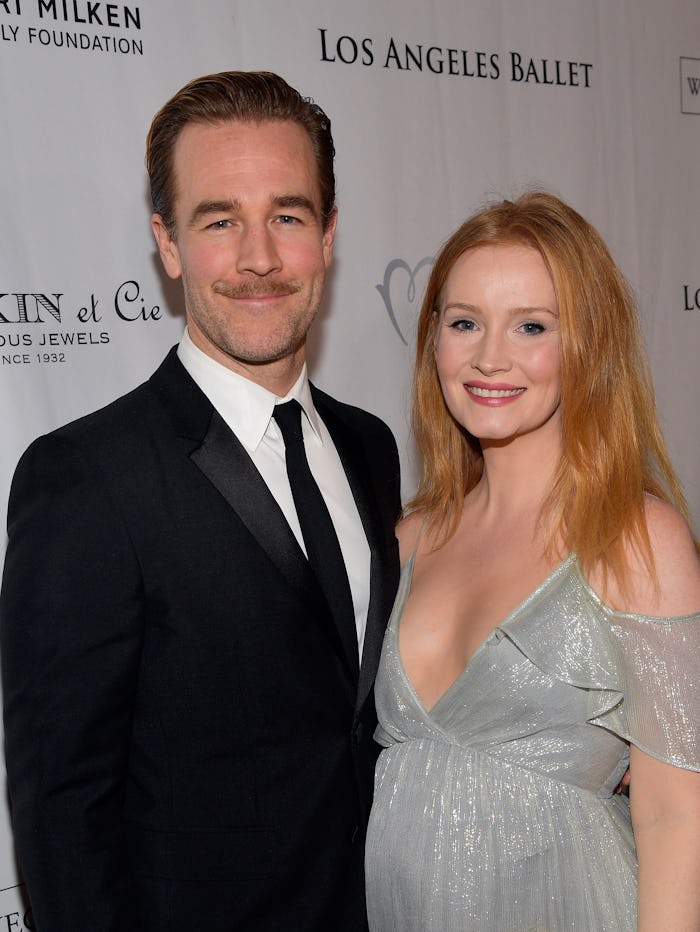Entertainment

Why James Van Der Beek's Message About Miscarriage Is So Important
Although social media is helping to bring more awareness to pregnancy loss, there still remains a certain stigma attached to miscarriages. Women are sometimes made to feel that an early loss isn't something to mourn — or at the very least, that they shouldn't talk about it — even though for many people, losing a pregnancy is a devastating experience. Some women also struggle with feelings of guilt following a miscarriage. Could it have been prevented somehow? Was it because of something they did or didn't do? Honestly, it can be such a complicated grieving process, and everyone gets through it differently. That's why James Van Der Beek's message about miscarriage is so important.
Fans probably know the Dawson's Creek actor and his wife Kimberly have five gorgeous children together. (Seriously, check out his Instagram; they're freaking adorable.) What they might not realize is the Van Der Beeks have also experienced three miscarriages along the way — and the most recent one was right before Kimberly got pregnant with their youngest daughter, Gwendolyn, who was born in June, according to Today. On Friday, Sept.7, Van Der Beek took to Instagram to address the topic of miscarriage, according to Scary Mommy — and how the word itself inaccurately places blame on moms.
"First off — we need a new word for it. 'Mis-carriage,' in an insidious way, suggests fault for the mother — as if she dropped something, or failed to 'carry,'" he wrote, alongside a photo of himself, his wife, snuggling their baby girl. "From what I’ve learned, in all but the most obvious, extreme cases, it has nothing to do with anything the mother did or didn’t do. So let’s wipe all blame off the table before we even start." Van Der Beek continued:
It will tear you open like nothing else. It’s painful and it’s heartbreaking on levels deeper than you may have ever experienced. So don’t judge your grief, or try to rationalize your way around it. Let it flow in the waves in which it comes, and allow it it’s rightful space. And then... once you’re able... try to recognize the beauty in how you put yourself back together differently than you were before.
The father of five concluded his poignant message by inviting followers to share what has given them peace or hope in the aftermath of a miscarriage — along with suggestions for a new name for the term.
Van Der Beek's followers were quick to offer words of support and understanding — and some of them even shared their own heartbreaking experiences with miscarriage. One Instagram user wrote, "Thank you for this beautiful post! It hits so close to home for me. I had 4 pregnancy losses over a span of 16 years. When I had completely given up hope of having a child, my boy was conceived. He is the light of our lives, our greatest blessing, such a precious gift."
Another follower commented, "Oh my word thank you for this. I am Momma to 5 babies, two (identical twins) are in heaven. They died at 7-8 weeks. Someone once told me I’d slowly forget about it and wouldn’t hurt anymore over them. WHAT?? They are missed daily, and on their would be birthdays, my heart aches a little bit more than normal. Miscarriage needs to be thought differently and parents treated with much more grace and compassion."
Yet another Instagram user wrote, "Thank you so much for speaking about this topic. I have had 2 and my husband and I have no living children. I have hope that one day I will have a little one <3."
According to BabyCenter, as many as 1 in 5 known pregnancies end in miscarriage. (So chances are, you or someone you know has experienced one.) What's more is between 50 and 70 percent of miscarriages that happen during the first trimester are thought to be because of chromosomal abnormalities — meaning the fertilized egg cannot develop normally. Other times, they can be caused by issues during early development, such as an egg that doesn't properly implant. Other health conditions, like having an incompetent cervix or polycystic ovarian syndrome (PCOS), can contribute to pregnancy loss. So you see, it doesn't make sense for women to blame themselves for something that's out of their control.
Still, as someone who had had an early miscarriage, I can completely relate to women who question if it was something they did or didn't do that caused the pregnancy loss. Whatever term you use for it, miscarriage is a complex experience, and those who have suffered such losses should never be silenced or be made to feel guilty. Kudos to James Van Der Beek for shedding light on a something so many women and couples experience — but are either hesitant to address, or are silenced by others who dismiss their pain.